Introduction
Do Pigeons Make Good Pets: Pigeons, often regarded as the unassuming denizens of our urban landscapes, have a unique charm that has piqued the curiosity of pet enthusiasts and bird lovers alike. While they may not be the first choice for a companion animal, pigeons pouter have quietly nestled their way into the hearts of those who have discovered their endearing qualities. The question that frequently arises, however, is whether pigeons make good pets. In this exploration, we will delve into the fascinating world of these feathered creatures to shed light on the suitability of pigeons as domestic companions. Pigeons, scientifically classified as members of the Columba genus, encompass a diverse array of species and subspecies, with the rock pigeon being the most commonly encountered one.
These birds are renowned for their distinctive cooing calls, iridescent plumage, and their ability to navigate vast distances with remarkable precision, traits that have earned them both admiration and mystique throughout history. The idea of keeping pigeons as pets is not a novel one. In fact, their association with humans dates back thousands of years, tracing its roots to ancient civilizations like the Egyptians and Romans. Over time, pigeons have been domesticated and bred for various purposes, such as messenger pigeons during wartime and ornamental purposes in the realm of pigeon fancying.
This rich history showcases the versatility of pigeons in human society. When contemplating the suitability of pigeons as pets, several factors come into play. Pigeons are relatively low-maintenance compared to more conventional pets like dogs or cats. They do not require the same level of attention, grooming, or interactive play. This aspect can be particularly appealing to individuals seeking companionship without the demands of high-energy pets. Pigeons are also known for their gentle and docile nature, which can make them suitable for households seeking a calmer and less boisterous pet.
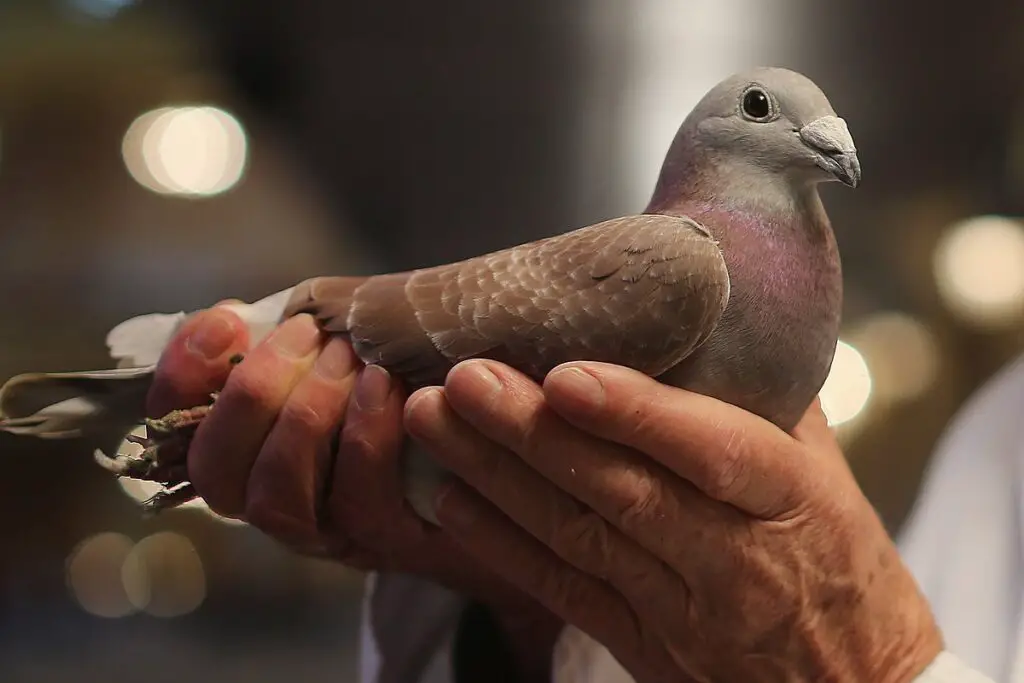
Do pigeons like being petted?
Pigeons are also loyal, loving companions who can express affection just as well as any other pet. Those who have been raised properly are quick to bond with knowledgeable owners. Pigeons often enjoy being taken out of their enclosure and being held and petted, or riding on a favorite human’s shoulder or head.
Pigeons, like many other birds, have individual personalities and comfort levels when it comes to human contact. Some pigeons may tolerate being petted or touched to some extent, while others may not be as receptive. The key to determining whether a particular pigeon enjoys being petted lies in observing their body language and responses.
To gauge a pigeon’s comfort with petting, it’s crucial to approach them slowly and gently. Abrupt movements or loud noises can startle them, so a calm and patient demeanor is essential. Begin by offering your hand for them to see and approach voluntarily. Allow the pigeon to make the first move, and if they seem curious or unafraid, you can attempt light and gentle strokes on their feathers.
Pay close attention to the pigeon’s reaction. If they appear relaxed, puff up their feathers, and may even close their eyes, these are positive signs that they may be enjoying the interaction. However, if the pigeon seems tense, flaps its wings, tries to move away, or coos in distress, it’s essential to respect their boundaries and cease the petting immediately. Pushing a pigeon to accept petting when they are uncomfortable can lead to stress and damage the trust they have in you.
Is it good to have pigeons at home?
Vastu experts state that the arrival of birds in the house implies an improvement in life’s fortune. In many cultures, pigeons are considered to be symbolic of fertility and prosperity, fortune, luck, and transformation. Having a pigeon’s nest in the home will bring prosperity and peace.
Pigeons are relatively low-maintenance pets compared to dogs or cats. They don’t require daily walks, grooming, or intense social interaction. This can be particularly appealing for individuals with busy schedules or those looking for a less demanding pet. Pigeons are known for their gentle and docile nature. They are generally peaceful birds, which can create a tranquil and serene atmosphere in your home. Their cooing sounds can be soothing and comforting.
Pigeons offer a unique type of companionship that may appeal to people seeking an unconventional pet. Their distinctive behavior, such as preening and nesting, can be fascinating to observe. Having pigeons at home can a closer connection to the natural world. Watching these birds can be a daily reminder of the beauty and diversity of wildlife, even in an urban environment.
Before considering pigeons as pets, it’s essential to check local regulations and zoning laws. Some areas have restrictions on pigeon ownership due to concerns about noise, droppings, or the potential attraction of pests. Pigeons need adequate space to fly, stretch their wings, and engage in natural behaviors. Housing pigeons in cramped conditions can lead to stress and health issues.
Can I pet a pigeon?
For the first few days, allow the pigeon to adjust – don’t touch him, but talk frequently and stay nearby the cage. Slowly build up to petting the pigeon gently. Allow your pigeon to explore your house. Allow him to come out of the crate, preferably in an enclosed space such as a small room.
If you want to pet a pigeon, it’s crucial to approach them slowly and calmly. Sudden movements or loud noises can startle them. Extend your hand slowly and allow the pigeon to see and approach you voluntarily. This respectful approach helps build trust. Pay close attention to the pigeon’s body language. If the pigeon appears relaxed, puffs up its feathers, and may even close its eyes while you stroke it, these are positive signs that they may be enjoying the interaction.
Pigeons have sensitive feathers, so it’s essential to be gentle when petting them. Use soft, slow strokes, and avoid applying too much pressure. Gentle, rhythmic strokes can mimic the sensation of being groomed by another bird, which some pigeons find pleasurable.Not all pigeons will enjoy being petted, and some may not tolerate it at all. If the pigeon seems uncomfortable, tenses up, tries to move away, or coos in distress, it’s crucial to respect their boundaries and stop petting immediately.
Building trust with a pigeon takes time. If you’re new to the pigeon’s environment, spend time near them without attempting to touch them. Offer food from your hand to create positive associations. Over time, as the pigeon becomes more accustomed to your presence, they may become more receptive to petting. Pigeons that have been raised in a nurturing and gentle environment from a young age may be more receptive to petting than pigeons that have had negative encounters with humans.
Do pigeons carry diseases?
Diseases associated with pigeon droppings include Cryptococcosis, Histoplasmosis and Psittacosis. You can become infected with these diseases by breathing in the dust that is created when cleaning droppings. The risk of pigeon-related diseases is rare.
The primary route of disease transmission from pigeons to humans is through contact with their droppings, feathers, or respiratory secretions. Inhaling airborne particles contaminated with pigeon droppings can pose a risk, particularly in enclosed spaces with poor ventilation. Direct contact with pigeons or surfaces contaminated with pigeon excrement can also lead to disease transmission, especially if proper hygiene measures are not followed.
The risk of contracting diseases from pigeons is generally low for healthy individuals with strong immune systems. Individuals with weakened immune systems, young children, the elderly, and pregnant women are more susceptible to infections. Living in close proximity to large pigeon populations or in areas with poor sanitation can increase the risk of exposure.
To reduce the risk of disease transmission, it’s essential to practice good hygiene, especially if you have frequent contact with pigeons or areas where they congregate. Avoid feeding pigeons in public areas, as this can attract large flocks and contribute to unsanitary conditions. Wear gloves and a mask when cleaning areas contaminated with pigeon droppings. Properly dispose of waste materials, such as nesting materials and feces, to reduce the attraction of pigeons to your property.
Is it OK to grab a pigeon?
First, rest assured that catching a pigeon is indeed possible, and safe- for both the bird and for you. Your catching the bird will be a lot safer for her than if a predator catches her. You will not scare a pigeon to death or give her a heart attack. And pigeons are harmless to us.
Stress to the Bird: Capturing a pigeon can cause immense stress to the bird. Pigeons, like all wild animals, have a strong instinct for self-preservation, and being grabbed by a human can trigger fear and panic. This stress can be harmful to the bird’s physical and mental well-being.
Injury to the Bird: Handling pigeons without experience can lead to injuries to the bird. Pigeons have fragile bones, and improper handling can result in broken wings, legs, or other injuries. The stress of capture can weaken the bird’s immune system, making it more susceptible to illness.
Risk of Disease Transmission: Pigeons can carry diseases that can be transmitted to humans. Close contact with a pigeon, especially if you are not wearing gloves or taking proper precautions, can pose a health risk.
Legal Considerations: In many areas, it is illegal to capture or harm wild birds, including pigeons. Laws and regulations protect wildlife, and attempting to capture a pigeon without proper authorization can result in legal consequences.
Are pigeons safe to touch?
One of the most common diseases spread by pigeons to humans is histoplasmosis, caused by the fungus Histoplasma. Like psittacosis, it is highly infectious, although it isn’t quite as deadly. Symptoms of histoplasmosis are also flu-like.
Before and after handling pigeons or any birds, it’s essential to thoroughly wash your hands with soap and water. This helps prevent the potential transmission of diseases or bacteria that birds may carry. If you wish to touch a pigeon, approach them calmly and slowly. Sudden movements or loud noises can startle the bird, causing stress or panic.
Pigeons have delicate bones, so it’s crucial to use a gentle touch when handling them. Avoid squeezing or gripping too tightly, as this can cause injury to the bird. It’s best to avoid grabbing pigeons abruptly. Instead, extend your hand slowly and allow the pigeon to come to you if they are comfortable with the interaction. Some pigeons may be more receptive to touch than others.
Pay attention to the pigeon’s body language. If the pigeon appears relaxed, puffs up its feathers, and doesn’t show signs of distress, it may be more receptive to being touched. Always be respectful of the pigeon’s boundaries. If the bird seems uncomfortable, tries to move away, or displays signs of distress (such as rapid breathing or vocalizations), it’s crucial to respect their discomfort and discontinue the interaction.
Is pigeon lucky or unlucky?
The arrival of a pigeon in the house is a sign of happiness, peace, and prosperity, according to astrology. However, it is considered unlucky if the pigeon begins to build a nest in a corner of the house. It means that poverty will visit your home. You could face a financial crisis.
In many cultures, pigeons are seen as symbols of peace, harmony, and love. This association is likely due to the fact that pigeons often mate for life and are peaceful birds that coexist with others. In some cultures, pigeons are considered messengers of good news or bringers of positive messages. This belief may have originated from the historical use of pigeons as carrier pigeons, delivering messages in times of war or conflict.
In certain religious contexts, pigeons hold a positive connotation. In Christianity, for example, the dove, which is a type of pigeon, symbolizes the Holy Spirit and is associated with peace and divine presence. In urban areas, pigeons are sometimes regarded as dirty or as pests due to their droppings and the mess they can create. This negative perception may stem from practical concerns rather than superstition.
Some cultures have superstitions associating pigeons with bad luck. For example, in some parts of India, it is believed that seeing a pigeon on the morning of an event can bring bad luck. Beliefs about pigeons can vary even within a single culture. In some regions, pigeons may be seen as lucky, while in others, they are considered unlucky.
Is pigeons in balcony good or bad?
Symbol Of Happiness And Peace
The arrival of a pigeon in the house indicates happiness and peace. It can give you big success in less time. Although some people consider it inauspicious in the house, it is considered a good sign.
Pigeons, like many birds, can bring a touch of nature and beauty to your balcony. Their presence can be enjoyable to watch, and they may even become a source of relaxation and entertainment. Having pigeons on your balcony an opportunity to connect with urban wildlife. It allows you to observe their behaviors, such as nesting, feeding, and interactions with other birds.
Pigeons do not require much care or attention, making them relatively low-maintenance balcony visitors compared to traditional pets. You won’t need to food or water for them. Pigeons can be messy. Their droppings can accumulate quickly, making your balcony dirty and unsightly. Cleaning up after them can become a regular chore.
Pigeons may peck at plants, furniture, or building materials on your balcony, causing damage over time. Their nesting activities can also be disruptive. Pigeon droppings can carry diseases and parasites that may pose health risks to humans, especially if you come into direct contact with them or breathe in particles from dried droppings.
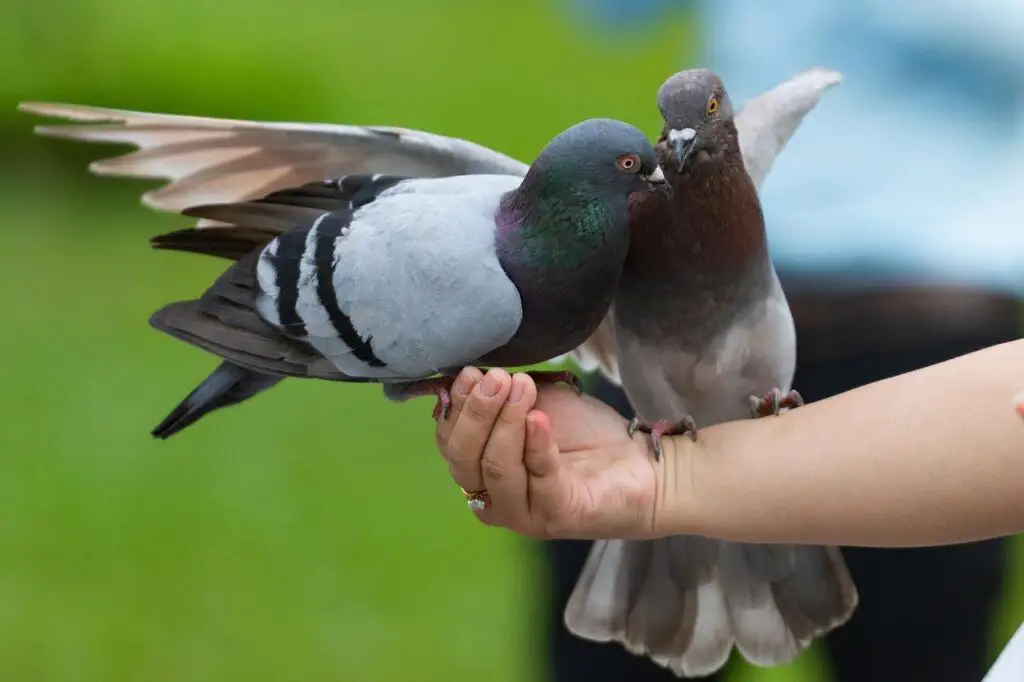
Conclusion
In pigeons, making good pets is a multifaceted one, and the suitability of these birds as domestic companions ultimately depends on individual preferences, circumstances, and the willingness to meet their unique needs. Pigeons possess a distinct charm that has attracted humans for centuries. Their gentle nature, low-maintenance requirements, and rich history of association with our species make them an intriguing choice for those seeking an unconventional pet. Their cooing calls, iridescent plumage, and quiet demeanor can create a sense of serenity and connection with the natural world that many find appealing.
One of the primary advantages of pigeon ownership is their relatively low maintenance. They do not demand the same level of time and attention as more traditional pets like dogs or cats. For individuals with busy lifestyles or limited space, pigeons companionship without the exhaustive responsibilities that often accompany pet ownership. Legal restrictions in some areas, concerns about noise and droppings, and the need for an appropriate living space are significant factors to weigh. Pigeons are social creatures and thrive in the company of their own kind, which can be a point of contention in a solitary domestic setting.
Ensuring their well-being, pigeon health, and mental stimulation also requires careful consideration and dedication. Ultimately, pigeons can make good pets for the right person or household. Their suitability as companions depends on factors such as living conditions, local regulations, and a willingness to the necessary care and attention. Those who are drawn to the unique charm of pigeons and are prepared to meet their requirements can find joy in their presence and a connection to a lesser-explored facet of the pet world. In making the decision to bring pigeons into one’s life, it is imperative to conduct thorough research, consult with avian experts, and assess one’s ability to a nurturing environment.

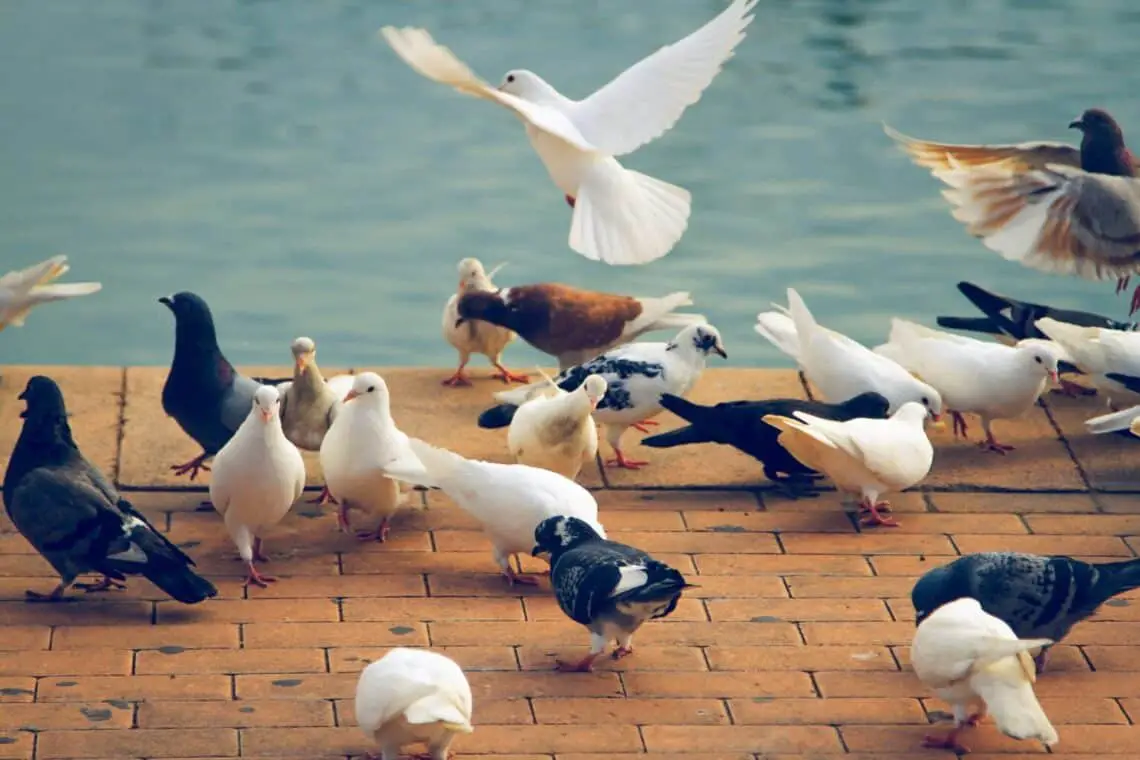
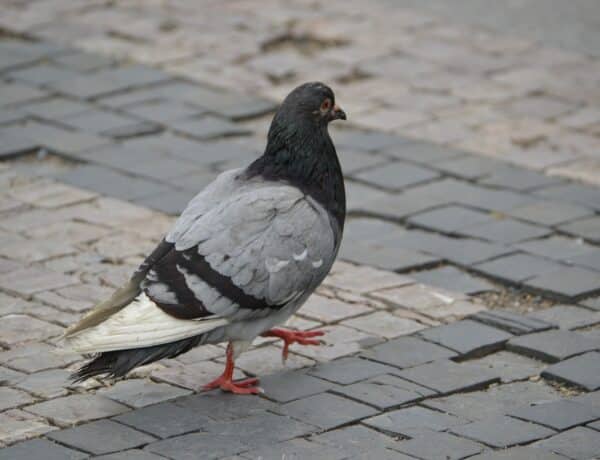
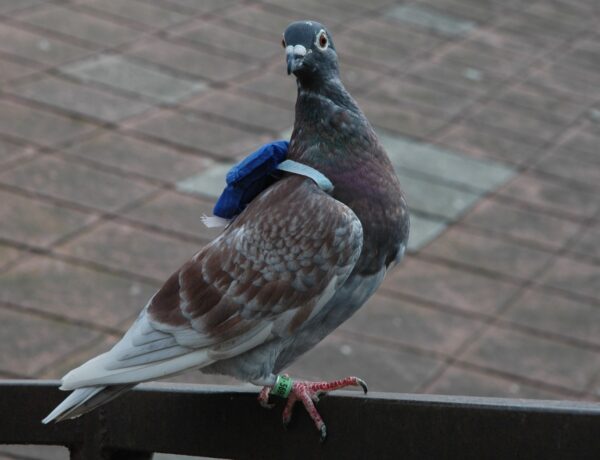
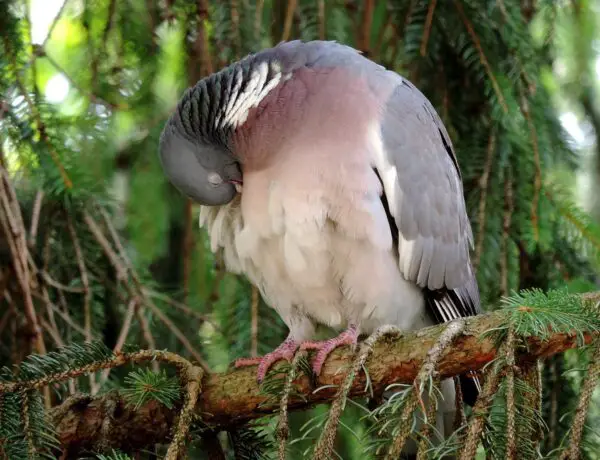
No Comments